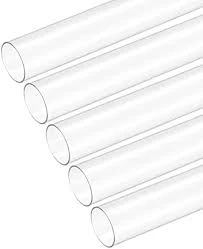ธ.ค. . 25, 2024 14:19 Back to list
Advantages of Using PVC Conduit Pipe in Electrical Installations and Construction Projects
Understanding PVC Conduit Pipe An Essential Component in Electrical Installations
In the realm of electrical installations, the choice of materials plays a pivotal role in ensuring safety, efficiency, and durability. Among the various options available, PVC (Polyvinyl Chloride) conduit pipes have gained immense popularity in both residential and commercial applications. This article explores the features, benefits, and applications of PVC conduit pipes, highlighting why they are an essential component in modern electrical systems.
What is PVC Conduit Pipe?
PVC conduit pipe is a type of tubing manufactured from polyvinyl chloride, a synthetic plastic polymer. It is designed to protect and route electrical wiring, providing a robust barrier against environmental factors and mechanical damage. Available in various sizes, thicknesses, and fittings, PVC conduit pipes cater to a wide range of electrical applications.
Features of PVC Conduit Pipe
1. Durability One of the most significant advantages of PVC conduit pipes is their resilience. They are resistant to many chemicals, moisture, and UV radiation, making them ideal for both indoor and outdoor applications. The physical properties of PVC ensure that the conduit remains functional and intact even under harsh conditions.
2. Lightweight Compared to traditional materials like metal, PVC conduit pipes are remarkably lightweight. This characteristic simplifies transportation, handling, and installation processes. Electricians can easily manipulate the pipes, reducing labor costs and installation time.
3. Corrosion Resistance Unlike metal conduits that may corrode over time due to exposure to moisture and chemicals, PVC pipes do not rust or degrade. This property not only extends the life of the conduit but also protects the wiring inside from potential damage caused by corrosion.
4. Cost-Effective The affordability of PVC conduit pipes makes them an attractive choice for contractors and electricians. The lower material costs, combined with reduced installation times, result in significant savings without compromising on safety or quality.
5. Non-Conductive As a non-conductive material, PVC ensures that there is no risk of electrical conductivity, which provides an extra layer of safety for installations. This characteristic makes PVC conduit an excellent choice for various electrical applications, particularly where grounding is a concern.
pvc conduit pipe

Applications of PVC Conduit Pipe
PVC conduit pipes are versatile and find applications in numerous sectors
- Residential Installations Used extensively in homes, PVC conduits can be found routing wiring for lighting, outlets, and appliances. Their waterproof properties are particularly beneficial in bathrooms and kitchens.
- Commercial Buildings In commercial applications, PVC conduit pipes protect wiring for office equipment, HVAC systems, and security installations. Their lightweight nature simplifies the often complex routing needed in commercial spaces.
- Outdoor Piping The UV resistance and durability of PVC conduit make it suitable for outdoor installations. It can be used to protect wires in external lighting, parking lots, and outdoor power supplies, ensuring longevity and reliability.
- Industrial Use In industrial environments, PVC conduit pipes safeguard wiring from potential hazards such as chemicals and heavy machinery impacts. They are commonly used in manufacturing plants, warehouses, and power generation facilities.
Installation Considerations
When installing PVC conduit pipes, it’s essential to follow local electrical codes and regulations. Proper planning for the layout, securing the conduits, and using the right fittings are crucial for a safe and effective installation. Additionally, while PVC conduit is excellent for most wiring applications, proper ventilation should be considered in enclosed spaces to mitigate heat buildup.
Conclusion
PVC conduit pipes are an integral part of modern electrical installations, offering durability, cost-effectiveness, and enhanced safety. Their versatility allows them to be used in various applications, significantly contributing to the efficiency of electrical systems. With ongoing advancements in materials technology, the future of PVC conduit pipes looks bright, continuing to support and protect electrical infrastructures worldwide. Whether for residential, commercial, or industrial use, PVC conduit pipe remains a trusted choice for electricians and contractors alike.
-
Durable PP Rigid Sheet: Lightweight, Chemical Resistant Solutions
NewsAug.21,2025
-
PVC Grey Sheet for Extraction: Chemical Resistant & Durable
NewsAug.19,2025
-
Durable PVC Pipe Fittings for Plumbing & Irrigation Needs
NewsAug.18,2025
-
HDPE Steel Belt Reinforced Spiral Corrugated Pipe | High Strength
NewsAug.17,2025
-
HDPE Pipe Fittings: Durable, Leak-Proof Solutions
NewsAug.16,2025
-
Premium CPVC Sheet: High-Temp & Chemical Resistant Solutions
NewsAug.15,2025

